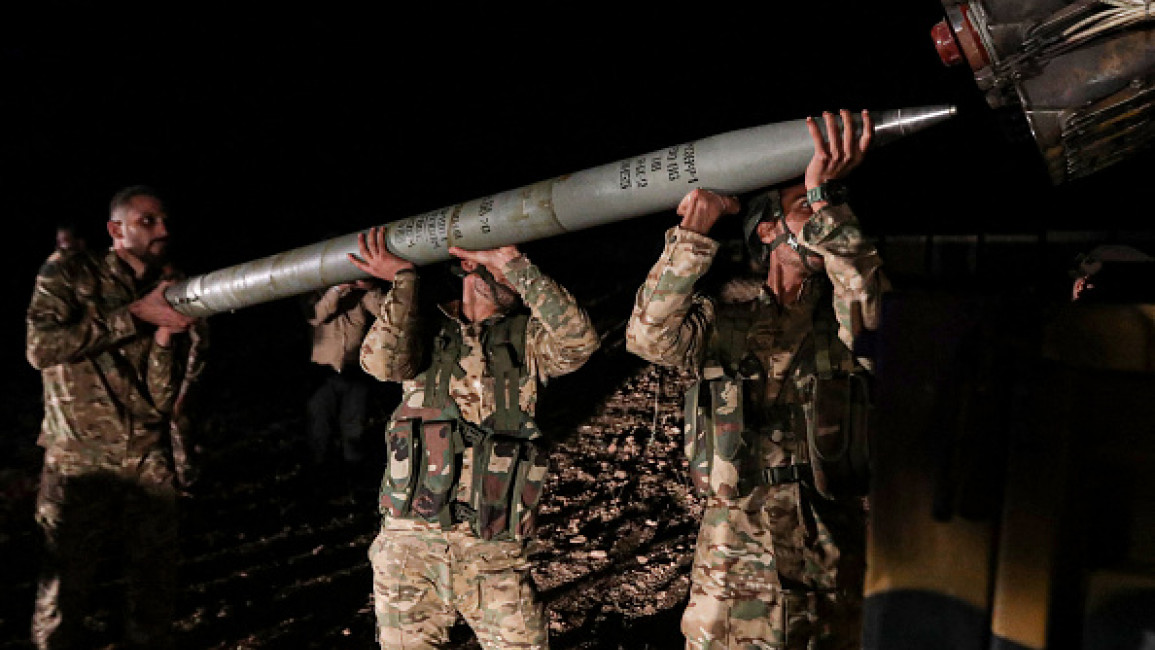Turkish drone strikes, tensions increase in Syria ahead of Turkey invasion
A high-ranking member of the YPG, a Syrian-Kurdish militia, was assassinated by Turkish intelligence, a Turkish news agency announced Monday, the latest in a series of Kurdish leaders killed by Turkey.
The YPG commander, Mihyedin Gulo, was an officer who provided training to YPG soldiers and "coordinated and planned actions against [Turkish] security forces," the Turkish agency said. He reportedly was killed on 9 August.
The strike comes as tensions between the Kurdish-led Autonomous Administration of North and East Syria (AANES) and Turkey come to a head.
"The Turkish drone strikes against YPG leaders are the expansion of the Turkish intelligence operations in Iraq. For some years, Turkish intelligence has assassinated PKK leaders in northern Iraq, trying to reduce the leadership capacity of the terror group," Ömer Özkizilcik, a Turkish foreign policy and security analyst, told The New Arab.
The New Arab contacted a Syrian Kurdish military spokesperson with questions but did not receive an answer by the time of publishing.
Turkey has threatened a military incursion into the area since June, the fourth such invasion it would have conducted against the AANES since 2016.
Turkish President Recep Tayyip Erdogan has promised to cleanse the area of "terrorists" and create a safe zone where he could return some of the 3.7 million Syrian refugees Turkey holds.
"Erdogan is making it increasingly clear that his vision is a military campaign that resolves Turkey's domestic political challenges from the presence of Syrian refugees," Nicolas Heras, the Deputy Director of the Human Security Unit at the Newlines Institute, told The New Arab.
Turkey considers the YPG and its US-backed umbrella organisation, the Syrian Democratic Forces (SDF), to be an extension of the Kurdish Workers' Party (PKK). Turkey is engaged in a 40-year-long conflict with the PKK, with the latter seeking to establish autonomy and more rights for Kurds.
The SDF has turned to the Syrian regime for help against another Turkish offensive. During Turkey's 2019 offensive into northeast Syria, the SDF allowed the Syrian regime to deploy along the border with Syria and on the outskirts of key cities.
In a July op-ed published in "Al-Sharq al-Awsat", Sihanouk Dipo, a member of the Syrian Democratic Council, which leads the AANES, said that rapprochement between it and Damascus is key to solving the Syrian crisis.
"The authority in Damascus is part of the solution and no one can say that …. our calls for this became stronger as Turkey's artillery moved towards us," Dipo wrote.
The SDF is a key partner of the United States, which has trained and equipped its fighters since 2015. It has been the main fighting force of the US-led Coalition to Defeat the Islamic State and holds tens of thousands of suspected IS fighters in prisons across northeast Syria.
Turkey and the US have been at odds over the group's presence in northeast Syria. Turkey views the SDF as an existential danger, while the US views it as a reliable partner.
In the past, the US has not intervened when Turkey invaded northeast Syria. However, it has made diplomatic efforts to deter Turkey from launching its most recent invasion.
"The Americans, the Iranians, the Russians, the Europeans and the Israelis are trying to deter Turkey and the [Syrian opposition] from launching another operation against the YPG," Özkizilcik said.
"While it is the US that threatens economic sanctions … it is the Russian military on the ground that blocks a military operation," he added.
Though the US blocked Turkey's purchase of F-34 fighter jets over its 2019 invasion of northeast Syria and threatened sanctions against key Turkish officials, Turkey has remained undeterred in its military approach to northeast Syria.
Human Rights Watch (HRW) warned that another invasion into northeast Syria could cause immense harm to civilians.
"Turkey and its allies have previously killed and arbitrarily arrested civilians following cross-border military operations that have resulted in massive displacement," Adam Coogle, deputy Middle East director at Human Rights Watch, said.
"Without taking adequate precautions, Turkish forces and their Syrian proxies risk repeating their abuses," added Coogle.


![Minnesota Tim Walz is working to court Muslim voters. [Getty]](/sites/default/files/styles/image_684x385/public/2169747529.jpeg?h=a5f2f23a&itok=b63Wif2V)




![Debris near Rafic Hariri International Airport [Getty]](/sites/default/files/styles/image_330x185/public/2176162423.jpeg?h=a5f2f23a&itok=MCSK9mkM)
![An Israeli air strike on Jabalia killed teenage journalist Hassan Hamad [Screengrab/X]](/sites/default/files/styles/image_330x185/public/2024-10/hassan%20hamad1.jpg?h=c12e0b96&itok=Rd_dyCVp)
